Hornbill school believes in the vital role The Arts can have in a child’s educational, social, emotional and physical development.
We aim to provide all children at Hornbill with opportunities to participate in, and engage with the arts as part of a curriculum that develops the whole child. We achieve this through varied opportunities throughout the academic year.
Hornbill School has successfully been awarded the Gold Artsmark four times. We will soon be embarking on our next Artsmark journey in order to reflect, once again, on our current Arts provision and to further develop our Arts curriculum and the experience our learners gain from it.
The awarding panel made these remarks about our most recent Artsmark submission (2018):
Hornbill School have developed an interesting arts curriculum and sets of enrichment opportunities for pupils within an international SE Asia context…Children appear to be proactive in their arts learning, and have opportunities to lead activities and shape input.
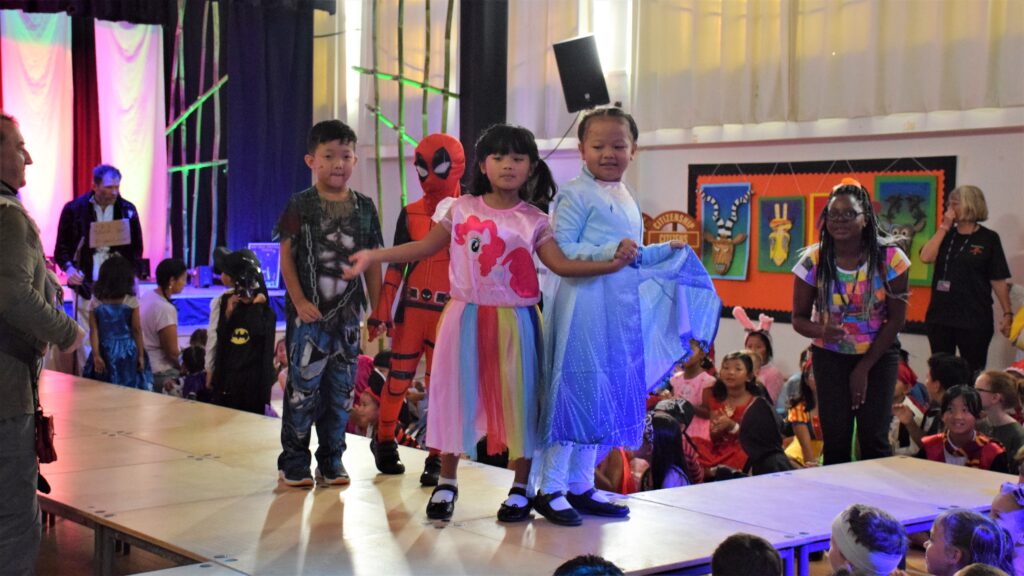
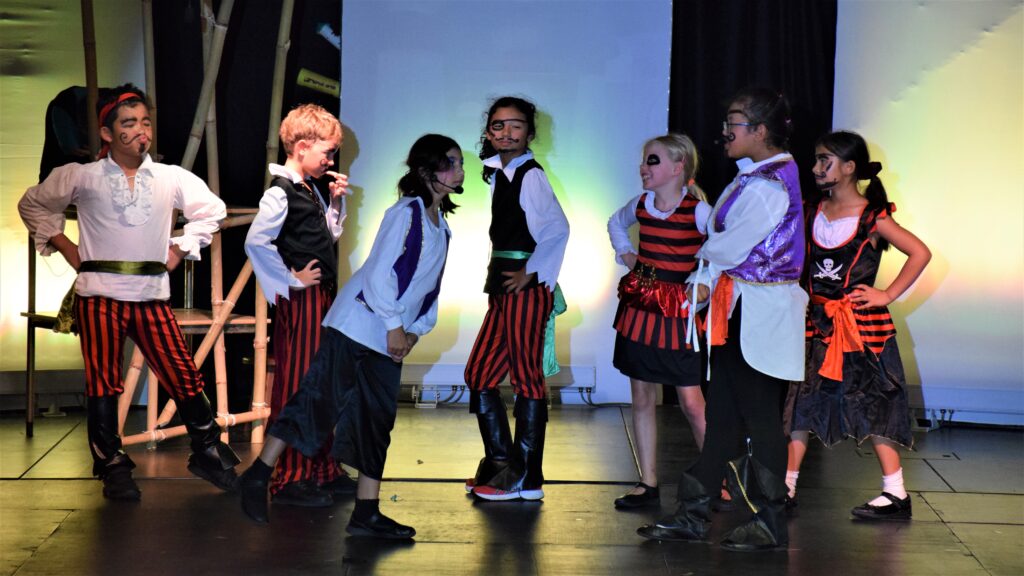
At Hornbill School, our strong and intrinsic links to our Nepali community afford us cultural strengths in The Arts that are very special and likely unique. Children and adults at our school can, and frequently do, perform Nepali dances, play instrumental music and sing. As a school community we also have opportunities to perform these cultural arts at venues with a wider audience, such as the annual Kalaratri celebration and Hornbill’s Glastonbill Festival of the Arts. The experience this gives our learners, both Nepali and non-Nepali, is rich and valuable.
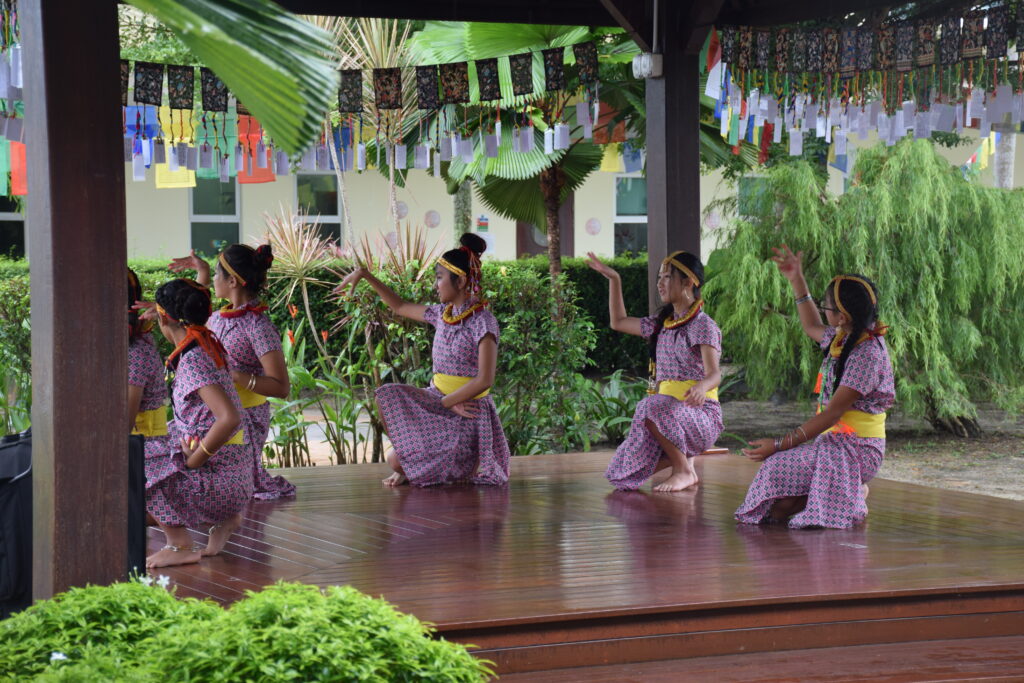
Our school environment lends itself to varied performance opportunities. Our Multi-purpose Hall boasts an excellent lighting and sound system for indoor performances; our Sports Hall can accommodate multiple year groups and parent spectators for indoor gymnastics and dance events; our shaded corridors, ataps and pagoda provide communal outdoor spaces for small group performances and our large fields enable larger audiences to gather to celebrate The Arts with us.
Art

At Hornbill school we strive to ensure that our learners receive a broad curriculum. As part of this, learners from Years 1 to 6 have a dedicated timetabled weekly art lesson with a specialist art teacher. We are fortunate to have a range of resources which allows the art curriculum to be varied and expansive. This includes a classroom specifically for the teaching of art – The Chameleon Room.
Our art curriculum is progressive across the year groups, allowing for skill development to take place. The curriculum aims to provide the children with a rich variety of experiences which will enthuse and stimulate creative thinking and skill.
The art curriculum objectives are taught through an integrated approach, in line with year group termly themes. Additional to weekly lessons, visits from artists (both local and international, where possible) and other creative activities make for a deeply rich experience of the arts.
The art curriculum covers many different skills including: drawing, painting, sculpture, textiles, computing, art history and art appreciation.
The teaching and learning of art, in all its myriad skill sets, aims to develop learners in a multitude of ways including: physically – through fine motor control skills; problem solving skills; development of critical thinking; co-ordination and also wellbeing – through creative expression. At the centre of every lesson is Hornbill School’s values education.
Our school environment is designed as a celebration of the arts. A strength is the display of enduring art work created by children around the school. A range of clay murals link to different aspects of the school including a Remembrance Garden, embodiment of the school values in clay figures, a map of the Garrison and an aquarium of sea creatures. Displays of children’s latest art work can be seen in corridors around the whole school also. This strength provides other members of the Artsmark family with an example of considered use of space to celebrate The Arts.
Music
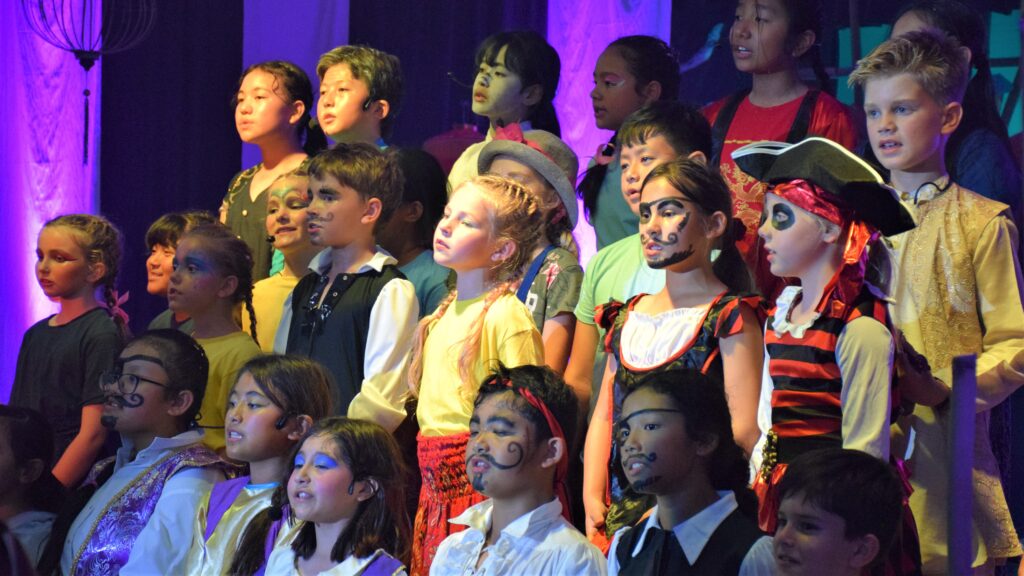
We provide varied opportunities for the children at Hornbill to participate and engage with music. As a whole school (years 1 – 6) enjoy weekly singing times. Through exploration of a vast array of songs, our learners work together to learn to sing the lyrics and melodies of songs. These include up-to-date popular songs and songs from past decades. This is an excellent time to build upon our focus on Learning Powers, with songs being chosen because the lyrics reflect these powers including: resilience, creativity and reflection. Working together in this way, our singing times work to develop citizenship and musical appreciation. Collaboratively the learners of Hornbill School create a joyous, uplifting sound as they join together in song.
At Hornbill School we are fortunate to have a close link with a community peripatetic music school. Highly skilled teachers from this music school come to our school on a weekly basis to teach individual and group music lessons to children who have signed up for this opportunity. Children learn to play the drums, keyboards, violins, guitars and have voice lessons also. Parents also have the opportunity to sign up to this same music school for out-of-school music lessons. On a termly basis, a musical recital takes place in which the children who learn with these teachers showcase their progress. It is an inspiration to other learners to see their peers displaying their talents, from those who are at the very beginning of their learning journey to those who have progressed to greater competence.
The Rhythm Box is our school’s music room. In this room are a wide array of instruments – both tuned and untuned – that are available for musical experiences. Teachers across the school incorporate musical activities into their thematic learning journeys and make use of this learning space to bring to life songs, atmospheric compositions, drumming rhythms and so on.
During the school’s CAS sessions (Community, Action, Service), options are also available to children to choose to participate in musical activities such as ‘The Hornbill Rockers’ and ‘Singing in Harmony’. Hornbill’s ELO (Extend Learning Opportunities) programme which takes place after school also allows for further musical development in opportunities such as African Drumming and Show Choir.
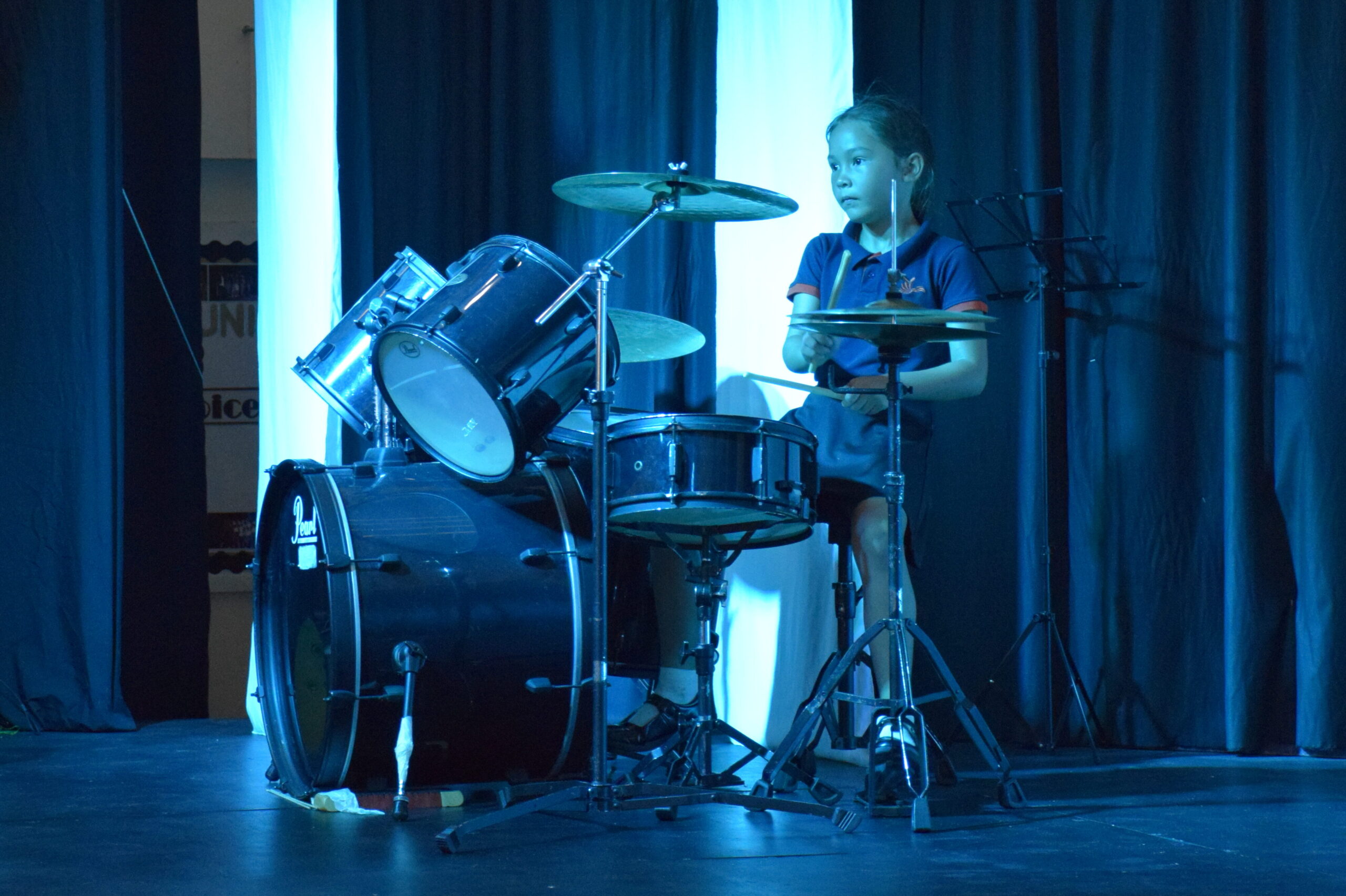
Drama
Throughout the year, teachers incorporate drama into their curriculum. Sometimes these opportunities are low key and sometimes on a much bigger scale. Children are often to be found working in our outdoor environment, rehearsing small sketches and scenes to perform or to record on their iPads. Year group assemblies proffer opportunities for drama, as do Launch and Landing Pads.
We place a strong emphasis on spoken word, specifically in relation to our high percentage of EAL learners. We believe that embedding the importance of being able to first speak with confidence before writing will have a significant impact on learner confidence and skills. From FS1, children are encouraged to use role play as a key vehicle for communication.
Each December, year groups rehearse and perform for parents plays relating to the story and meaning of Christmas. This may be as individual year groups or more collaboratively as shared year group productions. In this way, all learners at Hornbill School are on stage at this time of year.
In the third term of each academic year, the main school production is performed by the Drama and Music Workshop. This is an ELO provided from children in Years 4 to 6 and has accommodated 60+ children at its maximum. Recent productions performed by this group of learners include: Aladdin, Midsummer Night’s Dream, Mulan and The Firework Maker’s Daughter. We encourage the creative input of our learners within these productions, with children taking part in decision making, lighting, sound and even script writing.
Drama activities can take place in any learning space around the school but we also have a dedicated space for drama – Dramatis Personae.
Dance
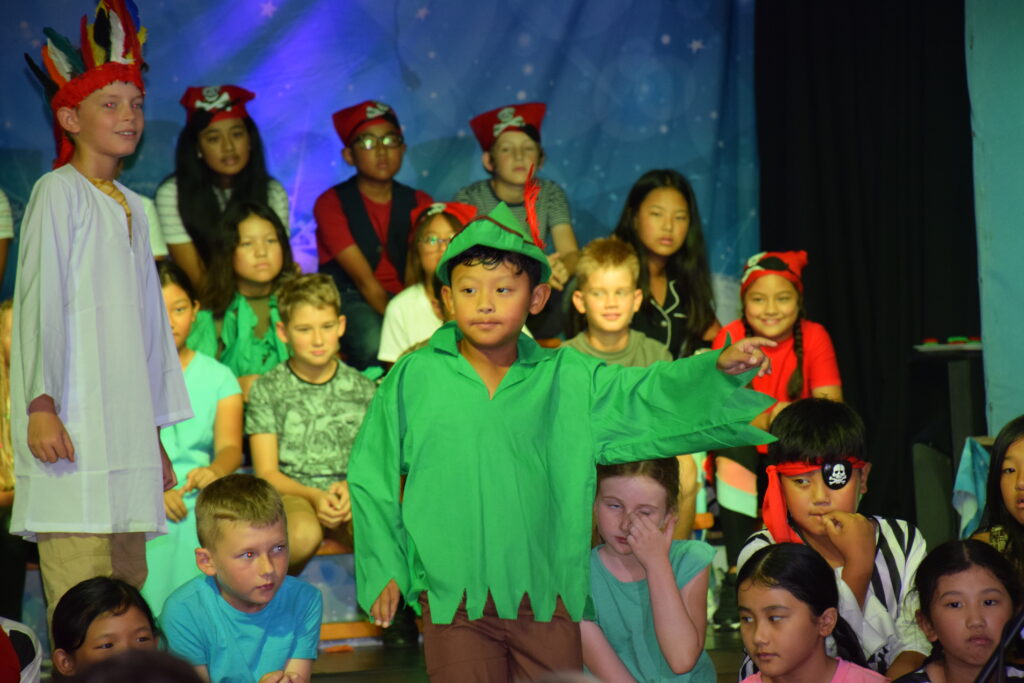
Dance is taught to all year groups within our Physical Education curriculum. Children explore space and movement using a wide range of musical accompaniment – sometimes recorded and sometimes produced live by peers. Dance is incorporated into year group assemblies, Christmas time productions, the main school production, the Year 6 Leavers’ Assembly, cultural celebrations, ELOs, CAS activities and in our Glastonbill Festival of the Arts.
Glastonbill – A festival of the arts
Glastonbill is a Hornbill School organised and hosted garrison community event. Our fourth Glastonbill Festival will be held in 2024. Glastonbill is an outdoor evening festival which celebrates the arts within the BFB community. Children and adults perform a variety of arts on an open-air stage. Performers have included children – present and past Hornbillers, teachers, governors, parents and other members of the BFB community. Over the years, the range of acts has been diverse and has ranged from solo to group performances. Examples of these acts include: solo singers, solo instrumentalists, children’s bands, dance acts – modern and cultural, comedy sketches, and light juggling. The concept behind Glastonbill is to inspire children to get involved in the arts through performing themselves or watching peers or adults performing. Glastonbill is also a chance for the BFB community to come together for an enjoyable evening of entertainment.